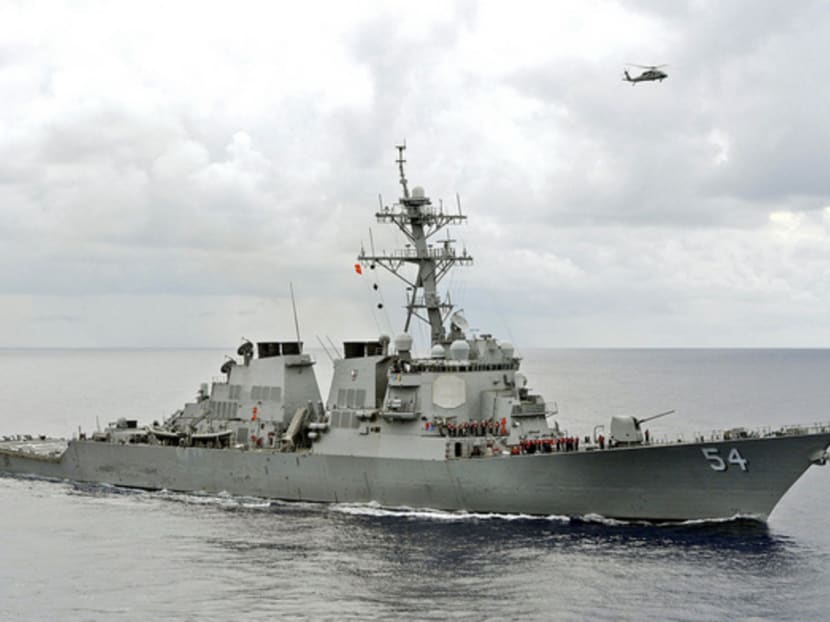Joint naval patrols meant to dial down South China Sea tensions: US admiral
HONOLULU — Joint naval patrols by the United States and other countries in the disputed South China Sea are meant to decrease tensions, said America’s top military commander for Asia Pacific early yesterday (Wednesday, Hawaii time), adding that the mooted joint patrols between Washington and New Delhi reflect their confluence of interests in the regional maritime domain.
HONOLULU — Joint naval patrols by the United States and other countries in the disputed South China Sea are meant to decrease tensions, said America’s top military commander for Asia Pacific early yesterday (Wednesday, Hawaii time), adding that the mooted joint patrols between Washington and New Delhi reflect their confluence of interests in the regional maritime domain.
“The more patrols we (the US) have, singularly or jointly, not only in the South China Sea but across the region, I think that helps to decrease tensions, and increase stability,” said Admiral Harry Harris, Commander of the US Pacific Command.
He said that these joint patrols reinforce the importance of the principle of freedom of navigation in the South China Sea, a large swathe of which is claimed by China.
When asked about a report this week saying the US and India could be planning joint patrols in the disputed waters by the end of this year, Admiral Harris said: “Our rebalance (towards Asia) and India’s Act East policy kind of comes together in the South China Sea. I think that is a very positive thing.”
Washington is challenging Beijing’s claim that much of the South China Sea is China’s sovereign territory. The US has mounted freedom of navigation operations there in recent months to show that American vessels can sail in international waters any time they desire.
Admiral Harris, who was speaking to a group of South-east Asian journalists at the US Pacific Command headquarters in Hawaii, said the South China Sea is international waters, and not the territorial waters of any country. “The South China Sea at large does not belong to any country,” he said, adding that the US welcomes all navies to join the patrols there.
Last month, China accused the US of violating its laws and of seeking maritime hegemony after the Pentagon said a Navy destroyer had conducted a freedom of navigation operation in the disputed waters. The warship had sailed within the 12-mile territorial zone of an island that China claims in the South China Sea.
The US and its allies have been alarmed in recent months by the speed at which China has enlarged tiny atolls and reefs to become larger islands. The islands are now equipped with military-size runways and the capacity to park fighter jets and berth naval ships.
In the past 18 months, China had reclaimed more than 1,200ha to build the artificial islands, compared with 87ha of land reclaimed by Vietnam, Malaysia, the Philippines and Taiwan in the past 40 years, Admiral Harris said in a recent speech in Washington, adding the US Navy would conduct more freedom of navigation operations.
A Reuters report this week cited an unnamed US defence official as saying the US and India had discussed joint patrols, including in the South China Sea, adding that both sides were hopeful of launching them within the year.
Admiral Harris yesterday stopped short of confirming the joint patrols. “Whether we do patrols (with India) or not, it is a matter of conjecture and let’s leave it at that,” he said.
Neither India nor the US has claims to the South China Sea, but both said they backed freedom of navigation and overflight in the waterway when US President Barack Obama visited New Delhi in January last year.
More than US$5 trillion (S$6.95 trillion) in shipborne trade moves through the South China Sea each year. Vietnam, Malaysia, Brunei, the Philippines and Taiwan also claim parts of the waterway.
One main reason the Pentagon has launched freedom of navigation patrols in the South China Sea is to reinforce existing international rules and norms in the region, including those associated with the United Nations Convention on the Law of the Sea, said a panel of geopolitical experts from the East-West Center (EWC) in Honolulu yesterday during a forum on US-Asia relations.
Dr Denny Roy, a senior fellow at the EWC, said the purpose of the joint patrols is to “invite others to make gestures of support for the rules”.
“From the US point of view, it is a way of demonstrating that the system of rules has value for most of the countries in the region,” he said. “The more countries that make a tangible demonstration to that effect, it emboldens everyone to speak out more loudly in support of those rules that may come under challenge.”
Dr Roy noted that such naval patrols may inadvertently escalate tensions in the region and make China “unhappy”.
But he added: “The question is whether you see anything that makes China unhappy as escalating tensions, or, on the other hand, it is sometimes necessary to signal to China that the Chinese behaviour itself sometimes raises tensions and other countries can push back.”







